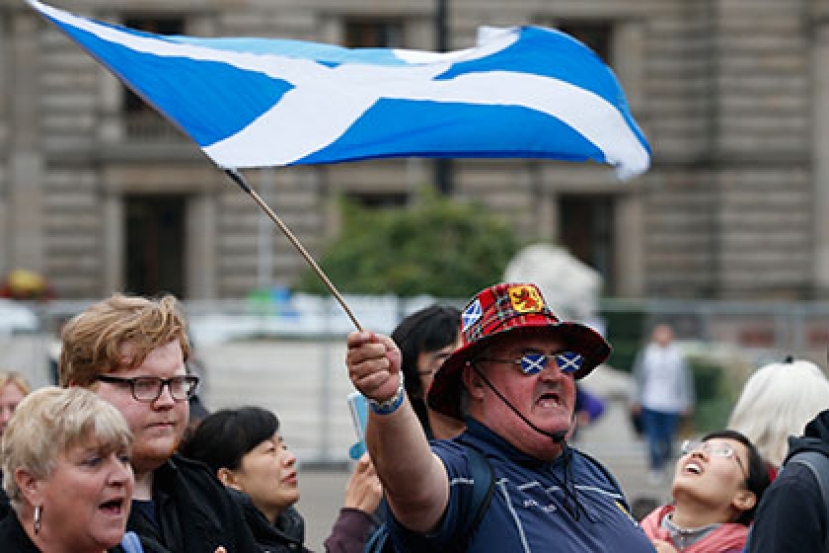Nicola Sturgeon challenges May with second referendum bill
13.10.2016 05:20
 Nicola Sturgeon challenges May with second referendum bill
Nicola Sturgeon challenges May with second referendum bill
Scottish first minister to publish draft bill for independence poll, saying she has mandate to defend Scotland’s remain vote.
Nicola Sturgeon warned that she was prepared to stage a second Scottish independence referendum before the UK quits the European Union as she attacked the Tories for their “xenophobic” rhetoric on the EU.
In a clear challenge to Theresa May’s government in London, the first minister told the Scottish National party conference in Glasgow she would unveil draft legislation next week to prepare for a rerun of the 2014 referendum within the next two years.
Her official spokesman cautioned that this was designed to give the Scottish government the full range of options. Sturgeon had a dual-track strategy and her immediate goal was to get the strongest powers possible for Holyrood in the Brexit deal.
Sturgeon said a decision on triggering a second referendum was dependent on the strength of the new powers that would pass to Holyrood after Brexit, including powers that the Tories are unlikely to offer, on allowing separate policies on immigration and foreign affairs.
“It’s clear that beyond hardline rhetoric, the UK government has no detailed plan. So the Scottish government will set out a plan for Scotland,” she said. “It will require substantial additional powers for the Scottish parliament.”
But Sturgeon simultaneously stepped up her anti-Brexit rhetoric by confirming that the SNP at Westminster would work with other opposition parties and pro-EU Tory MPs to vote against the government bill to enable Brexit to take place, regardless of how significant Holyrood’s new powers became.
A UK government source said that strategy was “bizarre” because the Brexit bill was designed to protect Holyrood’s existing powers by embedding all existing EU legislation into UK law. It may also weaken Sturgeon’s hand in future Brexit talks: negotiations are due to start in late October, when the prime minister meets Sturgeon and the leaders of the Welsh and Northern Irish governments to agree on joint plans to prepare for Brexit.
“There are serious contradictions” in Sturgeon’s two-pronged strategy, the Cabinet source said. It was also premature to threaten a second vote: the UK would be seeking a unique deal with the EU which could meet many of Sturgeon’s conditions, he said.
But Sturgeon’s advisers say that speeding up the referendum bill process highlights an increasingly significant political divide between the Scottish and UK governments, showing Sturgeon’s increasing confidence that the Tory shift to a harder line on Brexit has strengthened her hand.
Sturgeon faces substantial obstacles to staging a second independence vote before the UK leaves the EU in March 2019. Scottish voters are still not convinced of the case for a fast second referendum, and Holyrood requires Westminster’s legal authority to stage one.
The latest poll, by BMG, published on Thursday by the Herald, found that there is no popular majority in favour of a second referendum. It found that only 12% of those voters who do not want independence would switch to support leaving the UK if there were a hard Brexit. It found 47% were against a new independence vote, 38% in favour and 12% undecided.
The economics of Scottish independence are still extremely difficult: the latest GDP data showed Scotland’s economy still growing at a third of the pace of the UK’s as a whole, and government data showed a £15bn Scottish spending deficit last year – 21% of all government spending in Scotland.
Opposition leaders said Sturgeon could have offered a far more constructive vision for reform of Scottish domestic policies but instead had increased the divisions and conflicts with the rest of the UK.
Sturgeon made clear that she planned to set out new policies in her main conference address on Saturday, but Ruth Davidson, the Scottish Tory leader, responded: “Her comments show she has given up on speaking for Scotland and is now solely playing to the SNP gallery. This isn’t the action of a first minister of Scotland, but an SNP fundamentalist who puts independence first, last and always.”
While the SNP does not have an overall majority in Holyrood, with 62 of 129 MSPs, the six Scottish Green MSPs could be expected to back a second referendum, giving Sturgeon a narrow majority.
Ian Murray, Scottish Labour’s only MP, said Labour in Westminster would not oppose measures to allow Holyrood to stage a new referendum if it was carried by a majority of MSPs because that would fuel Scottish resentment. However, Murray said it was extremely risky for Sturgeon to discuss staging a second referendum before the UK’s Brexit deal was agreed.
“Nobody quite knows what Brexit means, and to have a discussion on a second independence referendum is a dereliction of duty,” Murray said. “The country is completely divided [by Brexit]. We don’t need to see any more division layered on top of that.”
Kezia Dugdale, the Scottish Labour leader, said: “Nicola Sturgeon’s top priority is to divide our nation once again. But our country is already divided following the Tories’ reckless Brexit gamble and we should not be seeking further divisions. Our economy is in trouble, and the last thing we need is the uncertainty of another independence referendum.”
“The prime minister is approaching both the relationship between the four constituent parts of the United Kingdom and our relationship with the European Union as we leave in a constructive and engaged spirit that is focused on getting the best interests for the people of the UK.
“You only need to look at what she said when she took office on the steps of Downing Street about the importance of the union – the fact that her first visit she made out of Westminster was to see the first minister to let her know that we want to engage Scotland in this process and involve them in these consultations.” she added.
